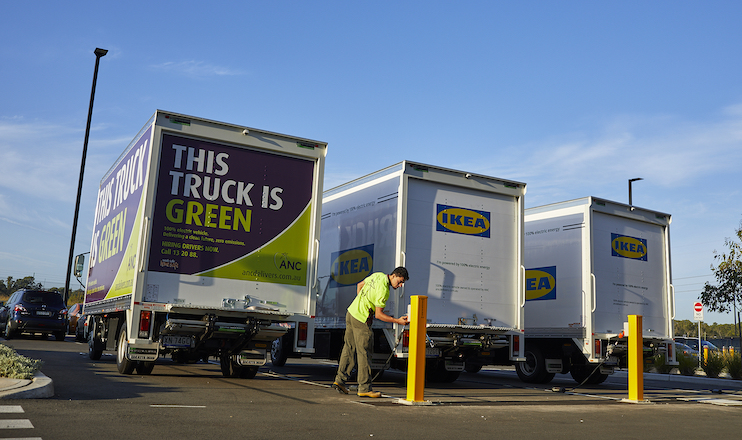Transport journey of sustainable mobility transition in Australia
In March 2019, IKEA Australia’s national delivery partner ANC unveiled the first of its commercial electric truck fleet, dedicated to IKEA’s New South Wales home delivery services. This was a landmark occasion in IKEA Australia’s ‘people & planet positive’ strategy towards 100% electrified metro home deliveries in all major Australian cities by 2025. The EV journey for ANC evolved out of a commitment to reduce their impact on the environment, with vehicle emissions being its most material issue.
In 2016 at the start of ANC’s journey, the Australian market was relatively immature in regard to commercial vehicle electrification. ANC researched over 40 global electric vehicle manufacturers and conversion companies, ranging from big international automotive icons to small start-up businesses, to determine fit for purpose models. ANC worked with their multiple stakeholders, including IKEA, staff and shareholders, to define electric vehicle fleet investment priorities.
ANC’s EV solution comprises a Hino 917 Series truck base installed with SEA Drive 120a electric componentry by Australian-based SEA Electric and a custom designed cargo box. The modular electric driveline enables the replacement of individual components as technology advances, extending the vehicle’s lifecycle. Components include electric battery packs with a lifespan of over 10 years which are 99.7% recyclable at end-of-life.
ANC spent a month training their drivers on the nuances of EVs, followed by another month of on-road testing, prior to the launch. While there was some initial driver hesitation, the response has been overwhelming with increasing interest from across the company to experience the EV difference.

Source: ANC
The EVs start and end their day at the IKEA depot, charging overnight and ready to deploy when drivers arrive in the morning. Currently the electric trucks take four to five hours to charge, however the goal is to decrease charging time down to two hours to meet the growing demand from the fleet.
For ANC, the pilot data has surpassed expectations and given ANC confidence to proceed with the greater EV fleet roll out. The vehicles are the first in what will be a fleet of 60 by 2025 to service IKEA. ANC Managing Director, James Taylor has said “our fleet consists of over 760 trucks, vans, utes, and crane trucks so the investment in three electric vehicles is just the beginning in ANC’s EV journey. We can only have a meaningful impact by working in partnership with industry leaders, clients, and suppliers to speed up the transition to electric. ANC is ready for the challenge and has other major retailers ready to commit to EVs.”
ANC’s fleet electrification journey is iterative and a continual learning process. ANC is now keen to understand how they can make the process easier, faster and more affordable going forward for IKEA and their other clients.
| The pilot identified several benefits of EVs for drivers, including: | Key challenges in sustainable mobility in 2019: |
|---|---|
| Improved capacity with the EV able to carry up to 400kg, more than the diesel equivalent | Comparative coverage and therefore routing from an EV single charge, and going beyond metropolitan deliveries |
| Improved productivity from increased cargo capacity | Higher upfront costs of the vehicles and charging equipment |
| Improved health and safety as the quiet electrified battery removes the noise, vibration and heat generated by traditional diesel engines | Total cost modelling is more challenging than the traditional diesel vehicles where the data and depreciation models are well known |
| Cost parity or less is the ultimate aim with no fuel costs and reduced maintenance | Limited choice of commercial EV suppliers in the Australian market |
| Lack of centralised and relevant trusted information to draw from | |
| Lack of collective industry discussion to prioritise the Australian market with manufactures | |
| Lack of government support, including incentives and public infrastructure. |


